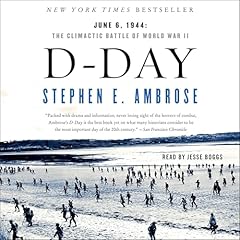
Amphibious Warfare in World War II
The History and Legacy of the War’s Most Important Landing Operations
No se pudo agregar al carrito
Add to Cart failed.
Error al Agregar a Lista de Deseos.
Error al eliminar de la lista de deseos.
Error al añadir a tu biblioteca
Error al seguir el podcast
Error al dejar de seguir el podcast
 Exclusivo para miembros Prime: ¿Nuevo en Audible? Obtén 2 audiolibros gratis con tu prueba.
Exclusivo para miembros Prime: ¿Nuevo en Audible? Obtén 2 audiolibros gratis con tu prueba.Compra ahora por $12.28
-
Narrado por:
-
Colin Fluxman
A swift, sudden attack from the ocean, putting soldiers ashore on a hostile coast at some point weakly defended by the enemy, has been a powerful tactical and strategic tool since the late Bronze Age. Utilized by the Sea Peoples against New Kingdom Egypt and the Greek city-states in their internecine wars, amphibious warfare combined high mobility with a strong chance of complete surprise.
The technique continued in use through such periods as the early Medieval era, when Viking armies numbering up to 10,000 men struck suddenly and devastatingly from the sea using their highly seaworthy longships or "dragonships" (drekkar). At around the same time, the Normans carried out amphibious landings of invasion forces, including mounted men, in Muslim-occupied Sicily (1061) and Saxon England (1066).
As navies grew larger and the Spanish clashed with the Turks in the Mediterranean during the Renaissance, some military forces introduced specialized marines for the first time. These men, trained specially for landings carried out using ships’ boats, formed a part of many European navies from the 16th century onward.
World War II, however, witnessed a sudden explosion in the scope and metamorphosis in the methods of amphibious warfare. With battlefields covering significant portions of the planetary surface, combined with the availability of the modern era’s powerful technology and vehicles, the mighty conflict witnessed tactical and strategic amphibious operations unlike any the world had seen before.
©2017 Charles River Editors (P)2018 Charles River EditorsLos oyentes también disfrutaron:






















